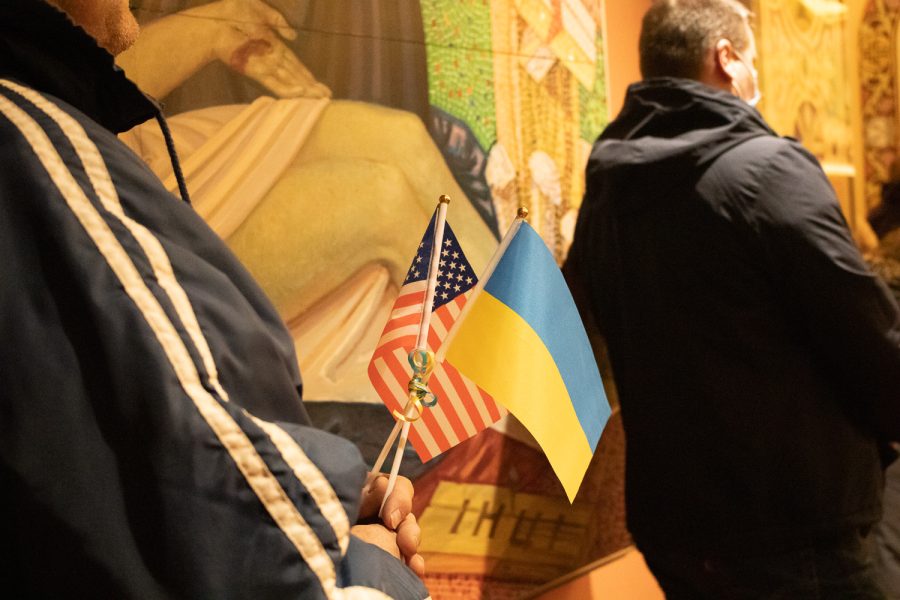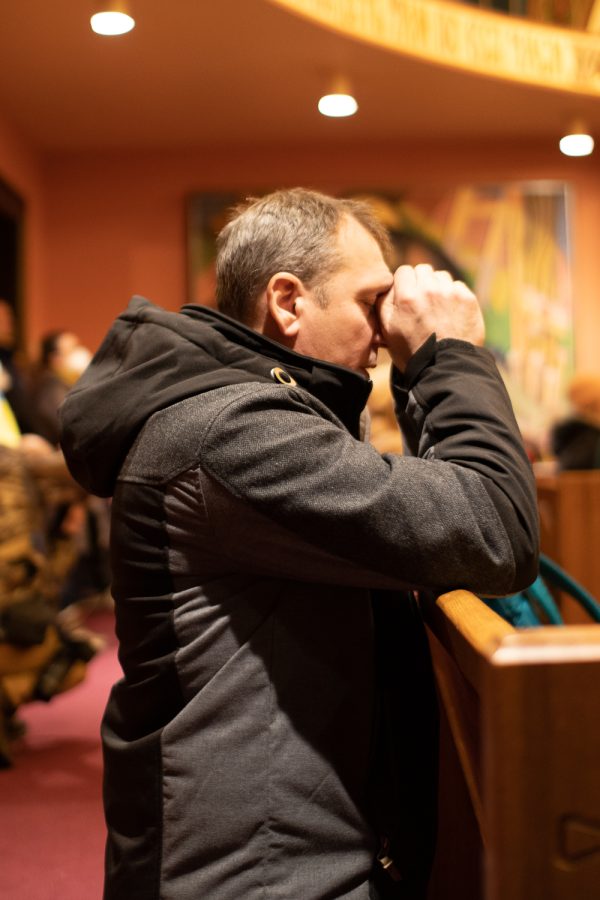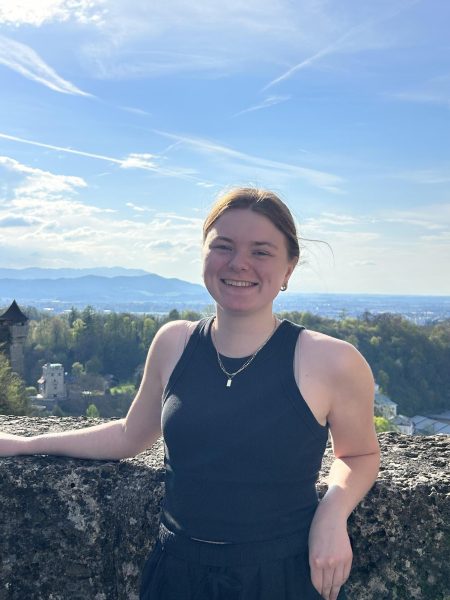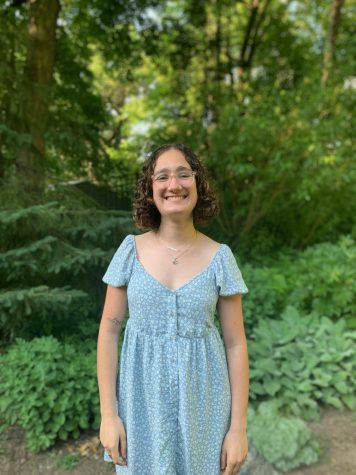Macalester community mobilizes for Ukraine
March 3, 2022
On Feb. 24, 2022, President Vladimir Putin of Russia declared the beginning of a “special military operation” in Ukraine, declaring war on the country. The war in Ukraine has impacted the Macalester community’s Ukrainian students, as well as Russian students and faculty, who are all personally affected by the war and have family and friends in the war zone. Across campus, members of the community have gathered to create campaigns and information sessions to raise awareness and donations for Ukrainians.
In the week that has followed, Ukraine has put up a fierce defense against Russia’s invasion. Thousands of Ukrainians joined the military to help defend their country. As of Wednesday March 2, Russian military forces have been unable to overtake Kyiv, Ukraine’s capital. If Putin hoped that his military would easily overtake the major cities of Ukraine in a “demoralizing blitz,” then he was wrong.
Western nations, such as the U.S. and countries in the European Union (EU), have rallied around Ukraine in the days following the initial invasion — declaring harsh economic sanctions on Russia, cutting off the country from the global payment SWIFT and providing weapons and humanitarian goods to the country. Over half a million refugees have fled to neighboring EU countries, mostly Poland and Romania. There has also been widespread Russian-civilian opposition to the conflict. In a country where it is incredibly risky to protest as a result of Putin’s authoritarian rule, Russians have rallied against the war.
Alisha Kirchoff, assistant visiting professor of sociology, explained that, in the context of this war, we must understand Russia as trying to reassert its imperial power over Ukraine.
“I think that the best way to characterize [the war] in a really straightforward and concise way is to think about Russia as seeing itself as an imperial power,” Kirchoff said. “It has historically been an imperial power, and it has historically seen Ukraine… as one of its subjects.”
At Macalester, the campus community has rallied around Ukraine. In attempts to answer some of these questions, events have taken place facilitated by Macalester professors and other experts in the field. These events included an “ask me anything” session hosted by Kirchoff during her class on authoritarian legality, a panel in the John B. Davis Lecture Hall as well as a virtual event entitled “Dangerous Nostalgia” with professor of international studies David Moore, professor of Russian and international studies James von Geldern and Carleton professor of Asian studies and history Adeeb Khalid.
The panel in the JBD Lecture Hall consisted of Kirchoff, professor of political science Andrew Latham and von Geldern.
Kirchoff, Latham and von Geldern each drew from their relative expertise to help explain the conflict. Latham began the conversation by acknowledging that, while the community was there in an academic context, this is not an academic exercise.
“The tragedy that’s unfolding is a long-running tragedy in some ways, but it’s become incredibly poignant in the last 48 hours, is in fact a tragedy,” Latham said. “There are real people whose lives are disrupted — and that’s to put it mildly. There are many people, many people your age, who are not going to survive this particular episode.”
These conversations across Macalester have all been important in providing occasions for the community to understand the history of the conflict and what factors contributed to Putin’s decision to invade Ukraine.
A member of the Russian Studies Department expressed the need to have these conversations and answer students’ questions.
“Our goal is to keep people informed about what is going on and not let it die in the 24-hour news cycle,” the department member, who asked to remain anonymous for their personal security, said.
Maya Sobchuk ’22, a Ukrainian-American student, explained how her whole life, particularly since she c
ame to Macalester, she has been trying to get people to talk about Ukraine but no one was listening until now.
“While it’s great that the world is finally giving a shit, it’s also really upsetting,” Sobchuk said. “We’ve been begging to be heard for a hundred years now.”
Sobchuk explained how people, including Macalester students, have an image of what a place of conflict looks like and Ukraine has never fit into this picture.
“At Mac, it’s surprising how people have a certain idea of what a place of conflict looks like,” Sobchuk said. “I’ve been screaming about the fact that Ukraine is one of them and people should pay attention, but that’s been completely ignored.”
As Latham said, however, these conversations are not just academic and have real-life consequences.
“In general the typical Ukrainian family right now is not doing well,” a student representative of Mac4ukraine, who has family in Ukraine, said. “[They are] probably underground in the subway, or in the bomb shelter, or in the house, sleeping with their clothes on and hoping to open for the war to end.”
The student has asked to remain anonymous for safety concerns.
To help Ukrainian citizens, a group of Macalester students created Mac4ukraine on Friday the 25th. Run largely through Instagram, these students are trying to raise funds and awareness for the invasion. On Thursday and Friday of last week, the group sat at a table on the second floor of the Ruth Stricker Dayton Campus Center to raise money for Ukraine and help educate Macalester students on what’s going on.
The representative from Mac4ukraine spoke on their goals with their campaign.
“So the goal is to first of all again, make sure we get as much money as possible into the right hand, into the hands of government organizations back home that need the most right now to protect civilians and reinforce the Ukrainian army and help refugees,” the student representative said.
Their second goal is to educate the Macalester community about what is going on in Ukraine and ensure that people are always informed. Their Instagram posts daily updates on the war from credible sources.
The response to their campaign has been overwhelming — they received over $5,000 in donations, mostly from Macalester students, to NGOs such as Come Back Alive Foundation.
Generally, Macalester students have been receptive and supportive of Mac4ukraine’s goals and they have expressed a desire to learn and help Ukrainians here and abroad. The organization is hoping to expand its efforts to get attention and donations from faculty and staff.
On a global and campus level, von Geldern is impressed by the support for Ukraine.
“The support for the Ukrainian side… is absolutely unprecedented as far as I can tell,” von Geldern said. “Macalester students have been wonderful, really been interested… [they’ve] really informing themselves about what’s going on.”
Von Geldern emphasized the need to reach out to both Ukrainians as well as Russian students who are both affected deeply by this conflict as many Russians don’t support the Putin regime and fully condemn this invasion.
“If students are interested in what they can do, the most important thing is to just be personally supportive of their fellow students,” von Geldern said.
A Russian student at Macalester, who has asked to remain anonymous due to safety concerns over their citizen status, said that the conflict is impacting themself too.
“It’s sad that Putin’s government is doing this [in] our name, even though we never voted for him, never supported his politics,” the Macalester student from Russia said. “Myself and many other Russians hate that Putin is trying to suppress our neighbor — all of us have friends in Ukraine, family members and it’s heartbreaking to look at this.”
The student from Russia was also pleased to see the institutional and community support for Ukraine.
“I am glad that Macalester doesn’t associate Russian students and Russian people with the actions of government,” the Russian student said.
In the future, Macalester staff and students are unsure what will happen. One thing that is certain is that Macalester students can continue to support Ukraine.
“I think [Macalester students] should know that the power is in everyone’s hands,” the Mac4ukraine representative said. “Power, in this case, might be as simple as venmoing someone. The question is how do they use this power and whether they use it all.”
“I think this is the moment when everyone needs to stand on one side to show the world that people believe in peace and people believe in support between nations… people don’t want war,” the student representative said.
On an institutional level, Macalester has publicly denounced the invasion. In a statement on Instagram last Thursday, President Suzanne Rivera expressed that Macalester “stands with the world in condemning Russia’s invasion of Ukraine.” The statement went on to provide support for the Macalester community members that are intimately affected by the conflict, and directed students in need of support to the Office of Student Affairs.
The Russian studies department was also quick to condemn the Russian government’s invasion of Ukraine and denounce its use of an “ahistorical narrative to justify war” in a statement sent out Thursday morning.
“We reach out to all Macalester students, particularly those from Ukraine and those of Ukrainian heritage, for whom the news coming from their homeland is especially horrifying,” the statement read. “We share your pain and we are here to support you.”
According to von Geldern, community-wide support for Ukraine is a unique showing of Macalester’s pillar of internationalism, as students and faculty rally around Ukraine.
“Macalester, the administration, I haven’t seen a whole lot from them. They haven’t been supportive of internationalism for a while,” von Geldern said. “I think that for the people whose lives are involved with this, it’s their fellow students and their teachers and the people they work with everyday that’s important.”
“One of the pillars of Macalester is internationalism, and I think many people here come to embrace this. This is the time, maybe the only time, where they really really can show how much of this value they actually support in action,” the Mac4ukraine representative said. “I understand, there’s a lot of performative activism — people do things momentarily and forget about it — but I think this is a time where people can try to sustainably show they’re internationally aware.”
















